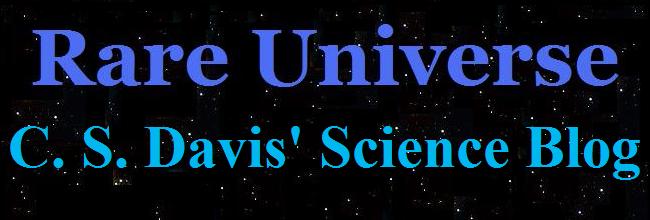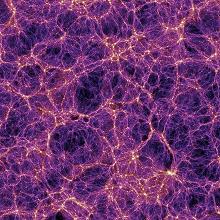

  |
| Home | Creation Evidence | General Science Info | Old Earth Creation | Creation Time Line | Links |
| |
|
||
Big Bang Theory
|
|||
|
By C. S. Davis
Oct 24, 2012
Do you enjoy the rantings of Sherman, or Leonard's dating woes, or is it the problems of their dysfunctional friends? Or is it the little bits of scientific strangeness and debates over unproven theories? One theory rarely covered, except within their clever theme song, is big bang theory.  What
is the significance
of this theory? What
is the significance
of this theory?In 1931, Priest and physicist Georges Lemaître proposed that the universe originated as a point of infinite density and then expanded to galactic proportions and is still expanding. He drew these conclusions from Einstein's field equations and Hubble's measurements of galaxy motion. His theory would one day be called the big bang. What so many forget, is that big bang theory is a creation theory. Prior to this, physicists proposed that the universe was eternal. If the universe had always existed, then the need for a god to create it disappears. The modern form of the theory includes inflation, a brief period of rapid expansion, where the universe goes from microscopic to galactic proportions in a fraction of a second. The big bang is not an explosion of matter expanding to fill an empty void. It is space itself that is expanding from microscopic size. Time begins at the big bang, there is no "before" that makes any sense to this universe. So here is a theory of universal origin where the universe, time, space, and all the matter and energy that has ever existed is created in a fraction of a second. Is this not a superb description of creation by God? And this theory is supported by 99% of cosmologists. Of course most cosmologists do not recognize the imprint of the Creator on this event. They have not read: "And you forget the Lord you Maker, Who stretched out the heavens and laid the foundations of the earth..." Isaiah 51:13 (NKJ) or "In the beginning God created the heavens and the earth." Gen 1:1 (NKJ) or "Thus says God the Lord, Who created the heavens and stretched them out..." Isaiah 42:5 (NKJ). Many more passages speak of God stretching out the heavens, even that he is stretching them still. These are predictions of future scientific discovery made in the Bible, thousands of years ago. It is known that the universe has been "stretching out" since the beginning, and it is still expanding. Cosmologists do not know why the universe banged into existence 13.7 billion years ago, or why this bang was just the right sort of bang to produce a stable long lasting universe that is so well suited for complexity and life. But they can detect what happened and when it happened and answer a lot of physical questions about our universe and its history. But science can only measure physical events, it does not detect the supernatural. But these physical events tell us a lot about what might have caused them, and the most complete answer is God. What evidence is there that big bang theory is correct? The first line of evidence came from general relativity. This theory described gravity's effects on the universe at large, it also suggested that the universe would need to be either expanding or contracting. Edwin Hubble shocked the world when he discovered that all distant galaxies were receding away from us. The universe was confirmed to be expanding now and this had serious implications for the origin of the universe. If you back up the motions of the galaxies, following known laws of gravity and motion, the whole universe collapses into a point at a measurable time in the past. As you go back in time near this event, the universe would be so hot that familiar particles of matter could not exist. Moving forward in time, the temperature of the universe would cool, and normal things like protons, electrons, and neutrons could form. At still lower temperatures, atoms could form, but only in proportions set by the laws of physics and the conditions of the expanding universe. Theory predicted that the big bang would have produced all the universe's matter in the proportions of about 25% helium and 75% hydrogen. This is just what we find, the universe is 24% helium and 74% hydrogen and only 2% of other elements that have been manufactured in stars and supernovae since that time. If that wasn't enough, there is the cosmic microwave background (CMB). Hundreds of thousands of years after the big bang the universe would have cooled to the point that the ionized atoms produced earlier would combine with electrons to form neutral atoms. Ions interact with visible light, but neutral gases do not, so light can pass through unimpeded. So the light from this early time should pass through space until the current day. It wasn't until 1965 that the CMB was discovered. This background radiation came from all directions and at the same temperature, as big bang theory predicted. Its spectrum was red-shifted by the expansion of the universe and allowed for direct measurement of the universe's expansion and age. Detailed analysis of this radiation by NASA WMAP and other projects have determined the age of the universe to be 13.7 billion years. Over the years many theorists have tried to prove big bang theory false. They have proposed all kinds of other theories, but the big bang is still the best fit to the data. Big bang theory has stood up to 80 years of scientific scrutiny and has prevailed as the accepted theory of origin of the universe.
*Comments can be left on our Facebook page by commenting on the anouncement for this blog post. We welcome response in favor or expressive of alternate ideas and opinions. Please be courteous. Thank you. posted Oct 24, 2012 (c) 2012 RareUniverse.Org (see our terms of service) |